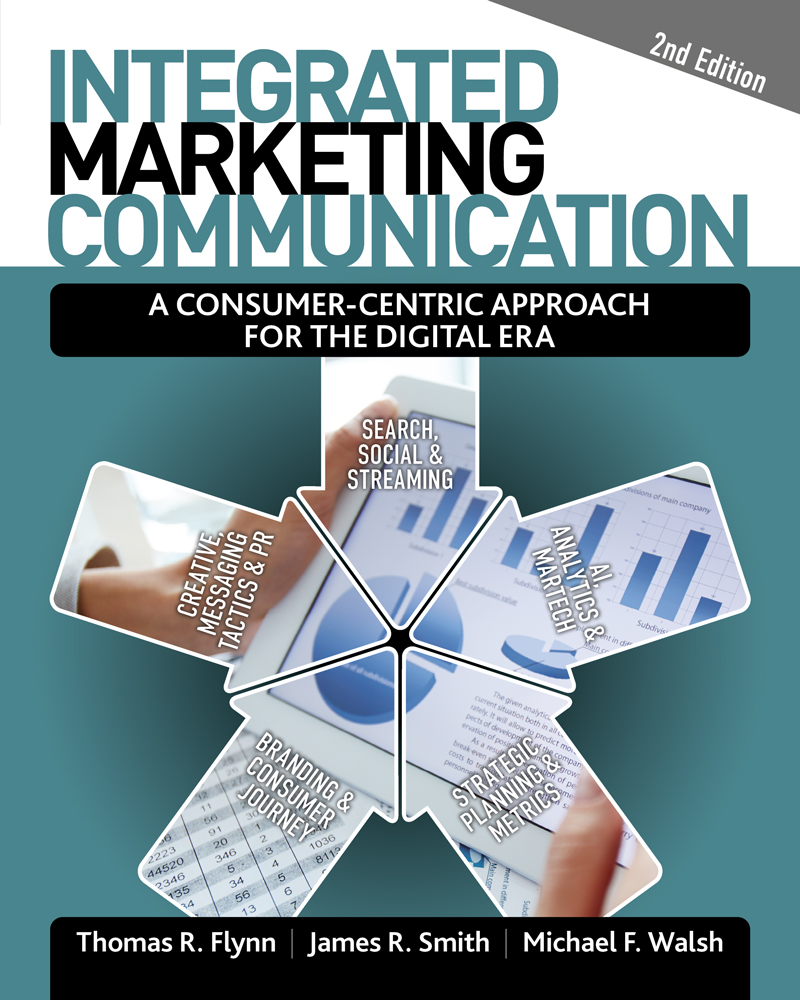Integrated Marketing Communication: A Consumer-Centric Approach for the Digital Era
Author(s): Thomas R. Flynn , James R. Smith , Michael Walsh
Edition: 2
Copyright: 2025
Pages: 514
Edition: 2
Copyright: 2025
Pages: 514
New Second Edition Now Available!
This decade, 2020-2029, is primed to become the most extraordinary period in marketing communication history. The environment is filled with cultural, economic, political and social turbulence. Our personal and professional lives are riddled with change and uncertainty. The rate of tech innovation is not waiting for brands, professionals or universities to catch-up. Aftershocks are creating a constant stream of newer normals.
There is at least one constant. Success remains firmly housed in effectively addressing consumer needs—where and when those needs arise.
The Integrated Marketing Communication (IMC) ecosystem is alive 24/7 every day of the year. Agility, data skills and metrics are marketplace imperatives. Will we be ready to meet the challenges? Bringing you up-to-date and providing information to better prepare you to meet current and future challenges are missions woven throughout the NEW Second Edition of Integrated Marketing Communication: A Consumer-Centric Approach for the Digital Era.
Integrated Marketing Communication: A Consumer-Centric Approach for the Digital Era by Thomas R. Flynn, James R. Smith, and Michael F. Walsh:
- integrates a data driven, consumer centric approach that’s in-synch with the current always-on IMC digital environment.
- focuses on the most durable principles of IMC, stressing best industry practices, such as: digital transformation, the consumer journey with touchpoints, enhancing the consumer experience, and the brand—consumer value exchange.
- includes three foundational IMC documents—consumer profile, creative brief, and media plan—serving to unify strategies and tactics.
- covers AI and marketing tech—the software and essential metrics used—IMC’s major creative and management tools.
- examines strategy and tactics for using the main IMC digital campaign resources: digital display ads, content marketing, ecommerce, email, mobile, search, social, social analytics and streaming audio and video.
- details budgeting, data analysis and creative strategies—plus the tactics to yield success.
- applies strategic and theoretical approaches to message creation.
- integrates concise backgrounders on traditional media and digital messaging platforms.
- is written by authors with actual work experience in IMC and related fields.
- embeds language and terms as they are used in the marketplace…you’ll be able to talk-the-talk. And there is never a shortage of new terms and acronyms in IMC.
Highlights to the Second Edition
New Coverage Threaded Throughout Relevant Chapters
- Artificial intelligence, like ChatGPT; marketing technology (martech) apps in IMC; metaverse.
- New: Data charts & graphics, Quick Cases & Reality Checks.
New AI Briefing providing the key AI basics important for IMC
Agencies, Consumer Behavior, Brands and Strategic/Media Planning (Chs 1-4)
- Ad agencies tackle new tasks, in-housing trend keeps growing.
- Consumer behavior: impact of Inflation, uncertainty & polarization.
- Brand purpose & activism refresh, audio branding.
- Increased audience fragmentation, rise of retail media networks streaming video & walled data gardens.
IMC Creative (Chs 5-6)
- New content marketing research, AI tools for content developers and creatives.
- Growth trends in Creator & Attention economies.
- More behavioral, persuasion, & neuroscience principles for creatives.
Traditional & Digital Media Platforms (Chs 7-10)
- Traditional media audience losses continue.
- Ad supported streaming grows, Netflix & others launch ad supported options.
- AI apps invade search and social; search and social also gain new ad formats.
- Surge in retail media networks (RMNs) as Target and Walmart ad businesses grow.
- Ecommerce available across all digital platforms, social video rises.
- Important advances, legal issues and changes in social media.
Public Relations, Promotion, & Ethics/Regulations (Chs 11-13)
- PR agencies: handling new duties; AI in PR; promoting thought leaders; & crisis management cases/tactics.
- Increased focus on: digital events, loyalty programs, promotion & product placements.
- Updates on brand safety, new privacy initiatives and dis/misinformation remain as bad actors proliferate.
- Coverage of ever-changing IMC ethics, & regulatory issues from AI to antitrust.
Briefing: Artificial Intelligence in IMC
1. Integrated Marketing Communication in the Age of Disruption
2. Consumer and Audience Behavior
3. Brands, Branding and Consumer Experiences
4. IMC Strategic Planning, Objectives and Media Planning
5. Message Strategies and Content Asset Management
6. Message Tactics
7. Traditional Advertising and Media Resources
8. Digital Basics, Direct Marketing, Email, Ecommerce and Website Resources
9. Digital Display, Search, Content Marketing and Mobile Resources
10. Social Media Resources
11. Public Relations Resources
12. Sales, Promotion and Sponsorship Resources
13. IMC Ethics and Regulation
Index
Thomas R. Flynn has served as president of the Eastern Communication Association and Chair of the Department of Communication at Slippery Rock University.
His teaching specialties include: communication law, integrated marketing communication, public relations and research methods. Flynn holds communication degrees from the University of Toledo (B.A.), Ohio University (M.A.) and the University of Nebraska (Ph.D.).
His consulting specialty is program development and assessment. He applied these skills in guiding development of SRU’s comprehensive Integrated Marketing Communication and Public Relations degree programs and has advised a number of outside agencies. Academically, Flynn’s authored over a dozen publications and made numerous professional paper presentations. He has also given a number of convention workshops on developing and curating IMC programs in higher education. Flynn admits to being an avid Cleveland baseball fan.
James R. Smith has over a decade of professional experience in advertising, public relations, newspaper, radio, and television. He taught in areas ranging from advertising and media management to research methods and sales. Smith is Professor Emeritus, Digital Media and Journalism, at SUNY-New Paltz. In the private sector, Smith has provided research and consulting services to organizations such as: ABC, Discovery, ESPN, HBO, NPR, the New York Stock Exchange, Time Inc., Warner Bros., Weather Channel, and various financial and investment banking firms. He holds communication degrees from Pennsylvania State University (Ph.D.), the University of Connecticut (M.A.), and the University of Nebraska (B.S.). Smith is Past President of the Broadcast Education Association and has also; served as department chair, led international advertising certificate programs, developed numerous online courses and has published in various professional journals.
Michael Walsh is Chair of the Marketing Department at West Virginia University’s John Chambers College of Business and Economics. Before receiving his doctorate from the University of Pittsburgh, Walsh served as a senior vice president at both Ketchum Advertising and TBWA Chiat Day. Walsh has worked with clients such as: Nationwide Insurance, Pizza Hut, PNC Bank, PPG Industries, and Rockwell International.
Walsh’s teaching interests focus on integrated marketing communications, service marketing and consumer behavior. He’s also authored numerous academic articles and papers. While at WVU, Walsh has received awards for Outstanding Teaching and Outstanding Service. He is actively involved with the American Marketing Association and the Association for Consumer Research.
Integrated Marketing Communication: A Consumer-Centric Approach for the Digital Era explains better than any other how to build synergy between marketing and communications channels, and how digital media supports an integrated strategy from conception to implementation.
Bonnie Harris
Wax Marketing, Inc.
As a professor in the field of communication, I have been search for years for a marketing textbook that really focuses on the communicative aspects of marketing. My current book was good about 10 years ago, but hasn't stayed up on the latest digital trends. Integrated Marketing Communication: A Consumer-Centric Approach for the Digital Era is extremely valuable because it combines the expertise and experience of three authors with different backgrounds. They have created a book that combines theory, industry terminology and the latest trends in marketing and advertising from an industry-insider's perspective. The chapters are packed with information that will really give students an idea about how current marketing works with effective visuals and up-to-date examples. It's fantastic! I also love that the authors have created ancillary items to accompany the text--lecture slides, video suggestions, updates with current events and a test bank. I've never had this type of resources before and I think they will really make my class better. In addition, the authors have been so helpful and that has made a big difference in my choice to adopt the book. Whenever I encountered issues they have quickly responded in a very friendly way. Knowing how responsive they are to my questions makes me confident I can handle any challenges that might emerge in the coming quarter.
Karen K. Myers, Ph.D.
Professor and Director of Graduate Studies
Department of Communication
University of California, Santa Barbara
In addition to being a comprehensive college textbook, it’s also an industry text for professionals. Recent cases are nuanced enough to distill how important digital marketing is to the IMC ecosystem. This book also does a fine job discussing digital strategies, targeting and using consumer data categories to refine marketing efforts.
The comprehensive chapters cover major topics such as; the attention economy, brand management, campaign budgeting, content marketing, loyalty programs, social media, strategic planning, and traditional media. I really appreciate the detail and focus on metrics.
Anthony Palomba
Darden School of Business
University of Virginia
New Second Edition Now Available!
This decade, 2020-2029, is primed to become the most extraordinary period in marketing communication history. The environment is filled with cultural, economic, political and social turbulence. Our personal and professional lives are riddled with change and uncertainty. The rate of tech innovation is not waiting for brands, professionals or universities to catch-up. Aftershocks are creating a constant stream of newer normals.
There is at least one constant. Success remains firmly housed in effectively addressing consumer needs—where and when those needs arise.
The Integrated Marketing Communication (IMC) ecosystem is alive 24/7 every day of the year. Agility, data skills and metrics are marketplace imperatives. Will we be ready to meet the challenges? Bringing you up-to-date and providing information to better prepare you to meet current and future challenges are missions woven throughout the NEW Second Edition of Integrated Marketing Communication: A Consumer-Centric Approach for the Digital Era.
Integrated Marketing Communication: A Consumer-Centric Approach for the Digital Era by Thomas R. Flynn, James R. Smith, and Michael F. Walsh:
- integrates a data driven, consumer centric approach that’s in-synch with the current always-on IMC digital environment.
- focuses on the most durable principles of IMC, stressing best industry practices, such as: digital transformation, the consumer journey with touchpoints, enhancing the consumer experience, and the brand—consumer value exchange.
- includes three foundational IMC documents—consumer profile, creative brief, and media plan—serving to unify strategies and tactics.
- covers AI and marketing tech—the software and essential metrics used—IMC’s major creative and management tools.
- examines strategy and tactics for using the main IMC digital campaign resources: digital display ads, content marketing, ecommerce, email, mobile, search, social, social analytics and streaming audio and video.
- details budgeting, data analysis and creative strategies—plus the tactics to yield success.
- applies strategic and theoretical approaches to message creation.
- integrates concise backgrounders on traditional media and digital messaging platforms.
- is written by authors with actual work experience in IMC and related fields.
- embeds language and terms as they are used in the marketplace…you’ll be able to talk-the-talk. And there is never a shortage of new terms and acronyms in IMC.
Highlights to the Second Edition
New Coverage Threaded Throughout Relevant Chapters
- Artificial intelligence, like ChatGPT; marketing technology (martech) apps in IMC; metaverse.
- New: Data charts & graphics, Quick Cases & Reality Checks.
New AI Briefing providing the key AI basics important for IMC
Agencies, Consumer Behavior, Brands and Strategic/Media Planning (Chs 1-4)
- Ad agencies tackle new tasks, in-housing trend keeps growing.
- Consumer behavior: impact of Inflation, uncertainty & polarization.
- Brand purpose & activism refresh, audio branding.
- Increased audience fragmentation, rise of retail media networks streaming video & walled data gardens.
IMC Creative (Chs 5-6)
- New content marketing research, AI tools for content developers and creatives.
- Growth trends in Creator & Attention economies.
- More behavioral, persuasion, & neuroscience principles for creatives.
Traditional & Digital Media Platforms (Chs 7-10)
- Traditional media audience losses continue.
- Ad supported streaming grows, Netflix & others launch ad supported options.
- AI apps invade search and social; search and social also gain new ad formats.
- Surge in retail media networks (RMNs) as Target and Walmart ad businesses grow.
- Ecommerce available across all digital platforms, social video rises.
- Important advances, legal issues and changes in social media.
Public Relations, Promotion, & Ethics/Regulations (Chs 11-13)
- PR agencies: handling new duties; AI in PR; promoting thought leaders; & crisis management cases/tactics.
- Increased focus on: digital events, loyalty programs, promotion & product placements.
- Updates on brand safety, new privacy initiatives and dis/misinformation remain as bad actors proliferate.
- Coverage of ever-changing IMC ethics, & regulatory issues from AI to antitrust.
Briefing: Artificial Intelligence in IMC
1. Integrated Marketing Communication in the Age of Disruption
2. Consumer and Audience Behavior
3. Brands, Branding and Consumer Experiences
4. IMC Strategic Planning, Objectives and Media Planning
5. Message Strategies and Content Asset Management
6. Message Tactics
7. Traditional Advertising and Media Resources
8. Digital Basics, Direct Marketing, Email, Ecommerce and Website Resources
9. Digital Display, Search, Content Marketing and Mobile Resources
10. Social Media Resources
11. Public Relations Resources
12. Sales, Promotion and Sponsorship Resources
13. IMC Ethics and Regulation
Index
Thomas R. Flynn has served as president of the Eastern Communication Association and Chair of the Department of Communication at Slippery Rock University.
His teaching specialties include: communication law, integrated marketing communication, public relations and research methods. Flynn holds communication degrees from the University of Toledo (B.A.), Ohio University (M.A.) and the University of Nebraska (Ph.D.).
His consulting specialty is program development and assessment. He applied these skills in guiding development of SRU’s comprehensive Integrated Marketing Communication and Public Relations degree programs and has advised a number of outside agencies. Academically, Flynn’s authored over a dozen publications and made numerous professional paper presentations. He has also given a number of convention workshops on developing and curating IMC programs in higher education. Flynn admits to being an avid Cleveland baseball fan.
James R. Smith has over a decade of professional experience in advertising, public relations, newspaper, radio, and television. He taught in areas ranging from advertising and media management to research methods and sales. Smith is Professor Emeritus, Digital Media and Journalism, at SUNY-New Paltz. In the private sector, Smith has provided research and consulting services to organizations such as: ABC, Discovery, ESPN, HBO, NPR, the New York Stock Exchange, Time Inc., Warner Bros., Weather Channel, and various financial and investment banking firms. He holds communication degrees from Pennsylvania State University (Ph.D.), the University of Connecticut (M.A.), and the University of Nebraska (B.S.). Smith is Past President of the Broadcast Education Association and has also; served as department chair, led international advertising certificate programs, developed numerous online courses and has published in various professional journals.
Michael Walsh is Chair of the Marketing Department at West Virginia University’s John Chambers College of Business and Economics. Before receiving his doctorate from the University of Pittsburgh, Walsh served as a senior vice president at both Ketchum Advertising and TBWA Chiat Day. Walsh has worked with clients such as: Nationwide Insurance, Pizza Hut, PNC Bank, PPG Industries, and Rockwell International.
Walsh’s teaching interests focus on integrated marketing communications, service marketing and consumer behavior. He’s also authored numerous academic articles and papers. While at WVU, Walsh has received awards for Outstanding Teaching and Outstanding Service. He is actively involved with the American Marketing Association and the Association for Consumer Research.
Integrated Marketing Communication: A Consumer-Centric Approach for the Digital Era explains better than any other how to build synergy between marketing and communications channels, and how digital media supports an integrated strategy from conception to implementation.
Bonnie Harris
Wax Marketing, Inc.
As a professor in the field of communication, I have been search for years for a marketing textbook that really focuses on the communicative aspects of marketing. My current book was good about 10 years ago, but hasn't stayed up on the latest digital trends. Integrated Marketing Communication: A Consumer-Centric Approach for the Digital Era is extremely valuable because it combines the expertise and experience of three authors with different backgrounds. They have created a book that combines theory, industry terminology and the latest trends in marketing and advertising from an industry-insider's perspective. The chapters are packed with information that will really give students an idea about how current marketing works with effective visuals and up-to-date examples. It's fantastic! I also love that the authors have created ancillary items to accompany the text--lecture slides, video suggestions, updates with current events and a test bank. I've never had this type of resources before and I think they will really make my class better. In addition, the authors have been so helpful and that has made a big difference in my choice to adopt the book. Whenever I encountered issues they have quickly responded in a very friendly way. Knowing how responsive they are to my questions makes me confident I can handle any challenges that might emerge in the coming quarter.
Karen K. Myers, Ph.D.
Professor and Director of Graduate Studies
Department of Communication
University of California, Santa Barbara
In addition to being a comprehensive college textbook, it’s also an industry text for professionals. Recent cases are nuanced enough to distill how important digital marketing is to the IMC ecosystem. This book also does a fine job discussing digital strategies, targeting and using consumer data categories to refine marketing efforts.
The comprehensive chapters cover major topics such as; the attention economy, brand management, campaign budgeting, content marketing, loyalty programs, social media, strategic planning, and traditional media. I really appreciate the detail and focus on metrics.
Anthony Palomba
Darden School of Business
University of Virginia






